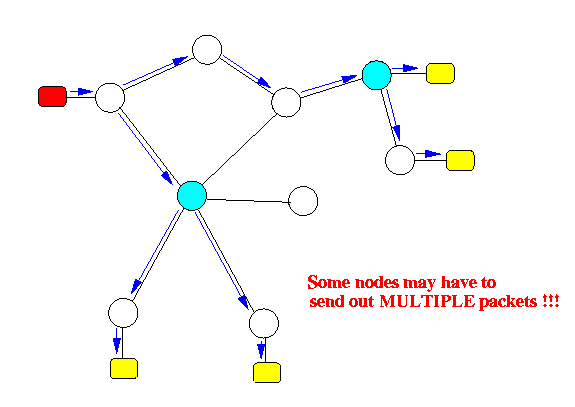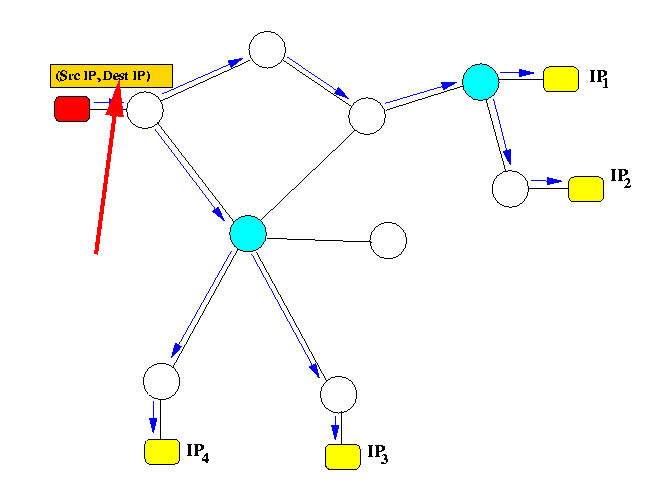- The most common form of network communication is between
two host in the network and the network routing infra-structure
has been set up primarily to support this form of communication.
Examples of such "traditional" communication:
- File transfer
- telephone conversation (three or multiway calling is rare)
- Web browsing
- We can distinguish three forms of communication:
- Unicast communication: when messages from a sender is received
by one receiver in the network
Unicast communication has been supported efficiently by using routing tables.
- Broadcast communication: when messages from a sender is received
by all receivers in the network
- Multicast communication: when messages from a sender is received by zero or more receivers in the network.
- Unicast communication: when messages from a sender is received
by one receiver in the network
- What types of applications are well-served by multicast ?
- Entertainment - e.g., video distribution
- Tele-conference involving multiple parties
- Stock quotes ! (Lots of people will be interested in obtaining the quotes)
- In summary: any application where there are multiple recipients for the same information
- Important to distiguish between multicast communication
and multicast routing:
- multicast communication: when a message from a sender is received
by zero or more receivers in the network.
You can realise multicast communication by having the sender transmit a copy of the (same) message to each receiver:

- multicast routing: forward a message to a set of receivers
in the network:

- multicast communication: when a message from a sender is received
by zero or more receivers in the network.
- Multicast or group communication existed long before multicast
routing...
Applications simply send multiple messages - one message to each
receiver.
Obviously, multicast routing can support multicast communication much more efficiently than "naive multicast communication" (= sending multiple unicast messages).
- The IP Multicast communication model:
- An IP multicast group consists of a number of IP hosts
that are interested in receiving the same set of messages
(e.g., participants in a video conference)
- Multicast receiver (i.e., a multicast group member) must
explicitly join a multicast group to receive
multicast messages for that group.
- Receiver can dynamically join and leave multicast group.
- Any host - even those that did not join the multicast group -
can send multicast messages to any multicast group.
- The sender has NO knowledge on the current set of members
in a multicast group....
As a result:
IP multicast must adopt unreliable delivery (UDP) (because how can you achieve reliability if you don't even know who the receivers are ???)
- An IP multicast group consists of a number of IP hosts
that are interested in receiving the same set of messages
(e.g., participants in a video conference)
- IP Multicasting was implemented by Steve Deering
in his Ph.D. thesis work at Stanford in 1993.
- Identifying a multicast group
- Before Deering's work, there was no multicast available on
the Internet
- Deering needed group IDs to identify a multicast group, so
that he can send messages to the members of the multicast
group:

- IP Multicast Address:
- 1110xxxxxxxxxxxxxxxxxxxxxxxxxxxx (multicast group address)
- The range of multicast addresses are:
-
11100000000000000000000000000000 to 11101111111111111111111111111111
- 1110xxxxxxxxxxxxxxxxxxxxxxxxxxxx (multicast group address)
- In dotted decimal notation:
- Multicast address ranges from: 224.0.0.0 - 239.255.255.255
(224.0.0.0 represents 11100000.00000000.00000000.00000000)
(239.255.255.255 represents 11101111.11111111.11111111.11111111)
- Multicast address ranges from: 224.0.0.0 - 239.255.255.255
- Before Deering's work, there was no multicast available on
the Internet
- IP Multicast Programming:
- Receive multicast messages
- Send multicast messages
- Receiving multicast messages
(for a multicast group G)
- In order to receive multicast messages destinated for
a multicast group G, a host must
join a multicast group G
- Steps to join a multicast group G
- Create an ordinary UDP socket
s = socket(AF_INET, SOCK_DGRAM, 0);
- Bind the UDP socket to some (unused) port#
struct sockaddr_in in_addr; /* Internet Address socket structure */ in_addr.sin_family = AF_INET; /* Protocol domain */ in_addr.sin_addr.s_addr = INADDR_ANY; /* Use wildcard IP address */ in_addr.sin_port = htons(portNumber); /* Use this UDP port */ bind(s, (struct sockaddr *)&in_addr, sizeof(in_addr) );
You need to publish this specific port# some how (a "meta problem")- the multicast messages sent to group G must use the same port# to communicate with members of multicast group G...
- Set up an IP multicast address structure:
struct ip_mreq mreq; /* IP Multicast request */ mreq.imr_multiaddr.s_addr = inet_addr("224.0.0.1"); /* Multicast group address */ mreq.imr_interface.s_addr = htonl(INADDR_ANY);The address inet_addr("224.0.0.1") is an example of a multicast group address
You can use any address between 224.0.0.0 and 239.255.255.255
- Join a multicast group using a set socket option system call:
setsockopt(s, IPPROTO_IP, IP_ADD_MEMBERSHIP, (char *) &mreq, sizeof(mreq) );
The variable s is a UDP socket that you have binded to some UDP port on the local host (see UDP programming)
- Create an ordinary UDP socket
- NOTE: the socket that is set to receive multicast message cannot be use in a sendto call in some implementations. So create another socket to send multicast messages !
- In order to receive multicast messages destinated for
a multicast group G, a host must
join a multicast group G
- Send IP Multicast messages:
- Simply use sendto with a UDP socket.
- Specify a multicast address in the socket address structure
and use the same port number specified by
the multicast receivers:
// Set up multicast group address and port # of multicast group dest_addr.sin_addr.s_addr = inet_addr("224.0.0.1"); dest_addr.sin_port = Same port used by receivers... // Send message in "line" to multicast group sendto(s, line, strlen(line)+1, 0 /* flags */, (struct sockaddr *)&dest_addr, sizeof(dest_addr)); ^^^^^^^^^^ multicast address - WARNING: Before you call "sendto",
you should set the TTL (time to live) of the socket
that you use to send multicast message with this set socket option
call:
char ttl = ...; /* Set a value between 1 and 255 */ /* Multicast with TTL = 1 will only reach your own network */ /* Multicast with TTL = 255 will reach the whole Internet */ setsockopt(s, IPPROTO_IP, IP_MULTICAST_TTL, &ttl, sizeof(ttl);
- Simply use sendto with a UDP socket.

- A multicast receiver:: click here
- A multicast sender:: click here
How to compile:
- cc -o mcast-recv mcast-recv.c -lsocket -lnsl
- cc -o mcast-send mcast-send.c -lsocket -lnsl
Usage:
- Run any number of receiver (on different computers) using:
mcast-recv MCAST_addr Port# - Use (one or more) multicast sender at (one or more) machine using:
mcast-send MCAST_addr Port#Type message into the mcast-send and see the message appear at all receivers....
(The presentation on multicast programming is to should you the effect of multicast programming; we won't do any programming with multicasting, that's why I kept it very brief)